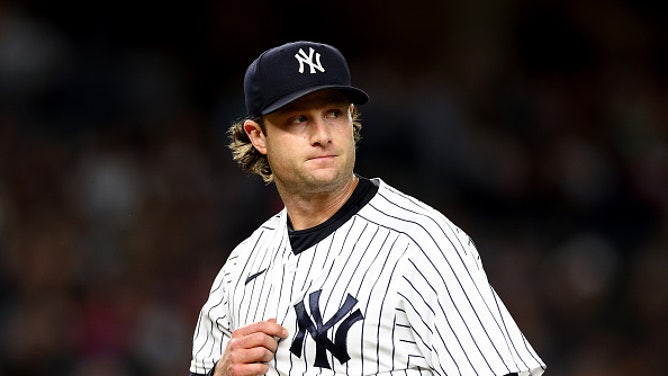MLB Discussing Minimum Innings Requirement For Starting Pitchers
Major League Baseball is not done tinkering with the rules of the game.
The league's pitch clock has generally been a success, lowering game times significantly and helping increase pace of play. Bigger bases, the infield shift ban, and pickoff rules were also introduced to encourage more offense and action. Yes, stolen bases are up, but offense has dropped again in 2024 thanks to the quality and depth of modern pitching staffs.
One of the league's remaining issues though, also revolves around the usage and obvious decline of starting pitching in the modern game. And baseball is reportedly exploring a "solution" to that frustrating problem.
In prior generations, starting pitchers routinely pitched complete games, or deep into games. In 1995, the top three starters finished 25 games on their own. This season though, there's been just 24 complete games, by the entire league.
Rob Manfred and the rest of the league have an idea of how to handle it: force pitchers to stay on the mound later into games. A new ESPN report has confirmed that the league's exploring a potential six-inning minimum for starters, with the goal of reducing injuries and increasing action.
"We are interested in increasing the amount of action in the game, restoring the prominence of the starting pitcher and reducing the prevalence of pitching injuries," an MLB official confirmed to ESPN. "There are a whole host of options in addressing those issues."

NEW YORK, NEW YORK - SEPTEMBER 23: Gerrit Cole #45 of the New York Yankees heads into the dugout in the third inning against the Boston Red Sox at Yankee Stadium on September 23, 2022 in the Bronx borough of New York City. (Photo by Elsa/Getty Images)
Would A Six-Inning Minimum Help MLB's Pitching Problems?
There's no question that the rise of the bullpen game and the "opener" has made baseball less interesting than it was in years past. Starting pitchers are recognizable and good ones are a motivation for fans to buy tickets. Paul Skenes, Clayton Kershaw, Gerrit Cole, Spencer Strider are important parts of what makes individual baseball matchups over the course of a marathon season worth watching.
But part of the modern baseball game is the never ending chase for higher velocities, higher spin rates and more breaking balls. All of those factors have contributed to shorter start lengths. Along with the coaching trend of instructing pitchers to go max effort on every pitch, as opposed to pacing themselves to last deeper into games.
According to ESPN, there would be exceptions to the six-inning minimum, though they are limited to just three:
- If the starter throws 100 pitchers or more before the sixth inning
- Giving up four earned runs or more before the sixth inning
- If there's an injury, though that exception would require an injured list stint afterwards
But how effective would this be?
One executive quoted by ESPN brought up the obvious issue with this: pitchers have now adjusted to throwing as hard as they can on every pitch. Asking them to change back seems unlikely and ultimately unwise; "The genie is out of the bottle when it comes to max velocity. I'm not sure it can go back in, no matter the rules."
There's also the issue of trying to legislate every aspect of the on field product; yes, fans like starting pitchers. But this change feels like an attempt to restrict the ability of teams to do their best to get outs. High velocity and higher effort leads to better results for pitchers. And seeing starters throwing 98-100mph is part of modern baseball, in the same way that elevate and celebrate is for hitters.
Not to mention that it seems unlikely that forcing pitchers to go deeper into games will prevent injuries. Especially with many pitchers decrying the impact of the pitch clock on arm fatigue.
Some starters have already demonstrated an ability to get hitters out without throwing 99mph 50 times per game. If baseball executives find that there's untapped value in those types of starters, they'll develop more of them. But don't try to force teams to only use a certain type of pitcher. That's not fun to watch either.